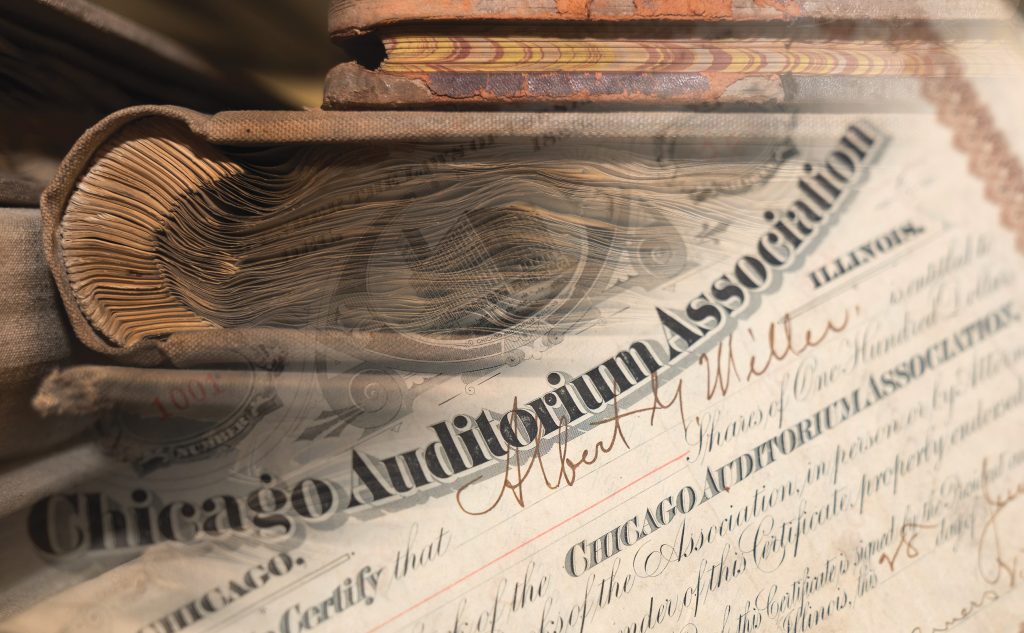
Roosevelt University is well known for its powerful founding story of social justice. Among its 90,000 alumni are such luminaries as former Chicago mayor Harold Washington, illustrator Shel Silverstein, and seven members of U.S. Congress.
But did you know that Roosevelt is also distinguished for its archival collections? Faculty, staff, students and alumni from around the world have used these archives to study a wide array of topics related to the University, the city of Chicago, architecture, African-American history, music education, the history of higher education, the labor movement, and the New Deal.
There are some 30 university, government and historical archives in the city of Chicago. While it is one of the city’s smaller archives, Roosevelt’s stands out for its special collections. Although the University was founded in 1945, the first (and only) full-time professional archivist, Laura Mills, was hired just 10 years ago in 2007.
“Roosevelt’s archives are incredible,” she said, “and I see my job as creating a road map for researchers to find the material they need for their work, and for the recovery of often forgotten history.”
With the help of student interns, she has taken on the daunting task of arranging the archives, digitizing the collections, and assisting researchers. Only a quarter of the collection — which consists of about 2,508 cubic feet of material — has been processed, and due to limited space in the Auditorium Building, much of the collection is stored on the Schaumburg Campus. Thanks to Mills’ work over the past decade, much of the Roosevelt archival collections today are catalogued and available to the Roosevelt community and general public.
Researchers who have visited the archives recently include Dr. Miyuki Kita, a professor at the University of Kitakyushu in Japan. She visited in November 2016 to examine documents related to Roosevelt’s founding, for a project on American universities and anti-Semitism in the 20th century.
The thousands of old papers, letters, speeches, photographs and ephemera, shelves upon shelves of books, the rapidly growing number of digital files —all are organized and preserved so that the remarkable information found within can more fully tell our histories. The following pages present some of the highlights of the archives.
Roosevelt University Archives
The photography collection preserves the institutional history of Roosevelt University, with more than 26,000 digitized images to date. The transformation of the bankrupt Auditorium Building and Hotel into a college campus is chronicled by hundreds of photos. The author of this article, Lynn Weiner, and Mills used this collection to assemble a photo history of the University, which was published by Arcadia Press in 2014.
There are also yearbooks, commencement programs and biographical files on approximately 1,000 professors, administrators and trustees, as well as the papers of former Roosevelt presidents. Boxes are filled with old class schedules; catalogs; news clippings; and student publications including The Torch, literary magazine Oyez Review, and alternative newspapers. The original letter signed by professors and staff who walked out of the Central YMCA College to protest the imposition of discriminatory admissions standards — leading to the foundation of this University — is also in the collection. So is the correspondence of the founders including such early financial supporters as Marshall Field.
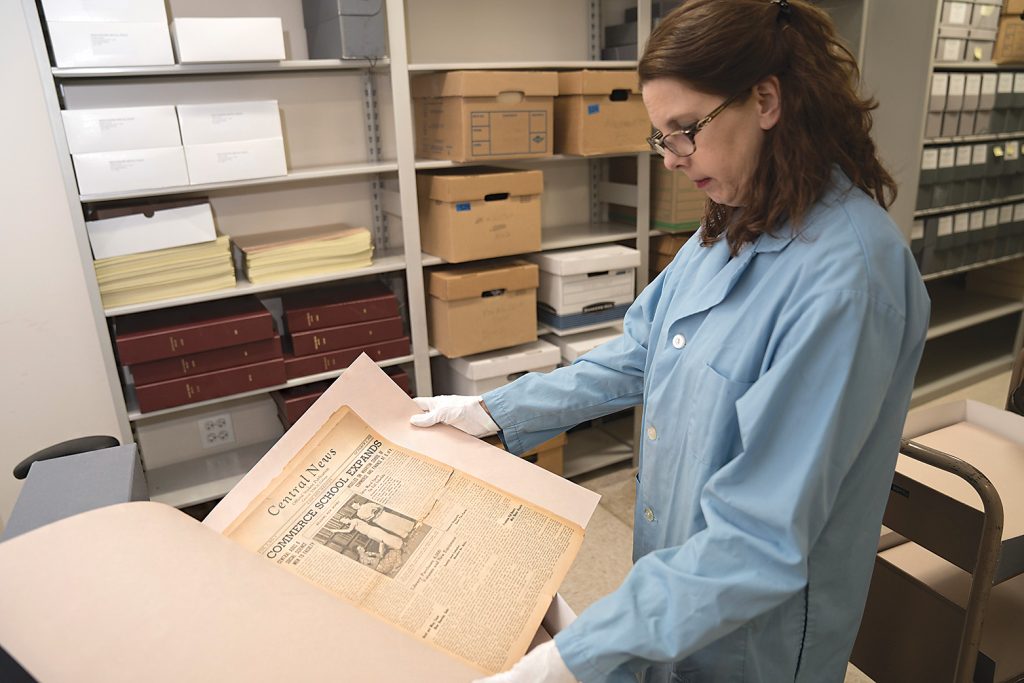
Archivist Laura Mills is dedicated to working with the resources we have to protect these many significant archival treasures. Her hope, she says, is “to make more people aware of the outstanding collections at Roosevelt so they can be put to good use and become part of the evolving historical record.”
One can find speeches by commencement speakers, lecturers, and a recently rediscovered file of correspondence by Eleanor Roosevelt during the years she headed the Roosevelt Advisory Board. Papers related to the visit of Dr. Martin Luther King, Jr. in 1957 have recently been recovered as well.
There are also objects related to the University, including Harold Washington’s mayoral office chair; University flags and seals; gifts from visiting dignitaries and to traveling presidents; and flyers, posters and souvenirs related to various anniversary celebrations and special events.
The Chicago Musical College Collection
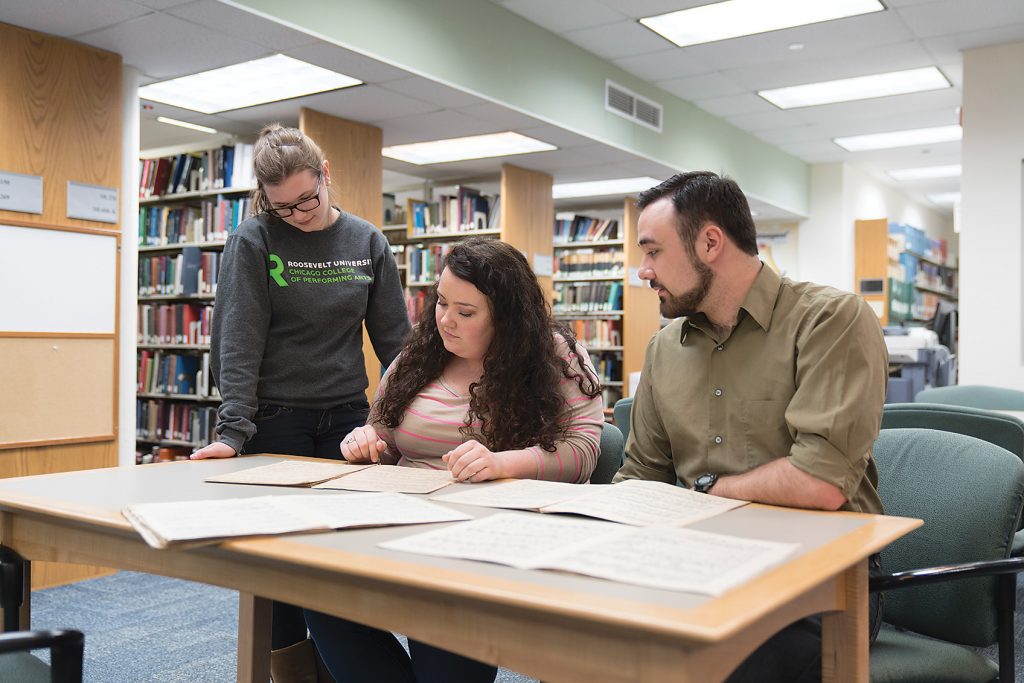
A forerunner to Roosevelt’s Chicago College of Performing Arts, the Chicago Musical College (CMC) was founded by Florenz Ziegfeld in 1869 and merged with Roosevelt College in 1954. This collection includes school catalogs from the CMC, recordings on vinyl and CDs, sheet music, and student account ledgers. There are collections in the archives proper but also in the Performing Arts Library, which is the largest conservatory library in Chicago.
There are musical scores of Rudolph Ganz, the founding dean of the Chicago Musical College at Roosevelt; and collections of books, scores, or other material from musicians Humbert Luccarelli, Ellis Schuman and Bernard Brindel, theatre professors Yolanda Lyon Miller and Joel Fink, and many others.

Joel Schick Collection
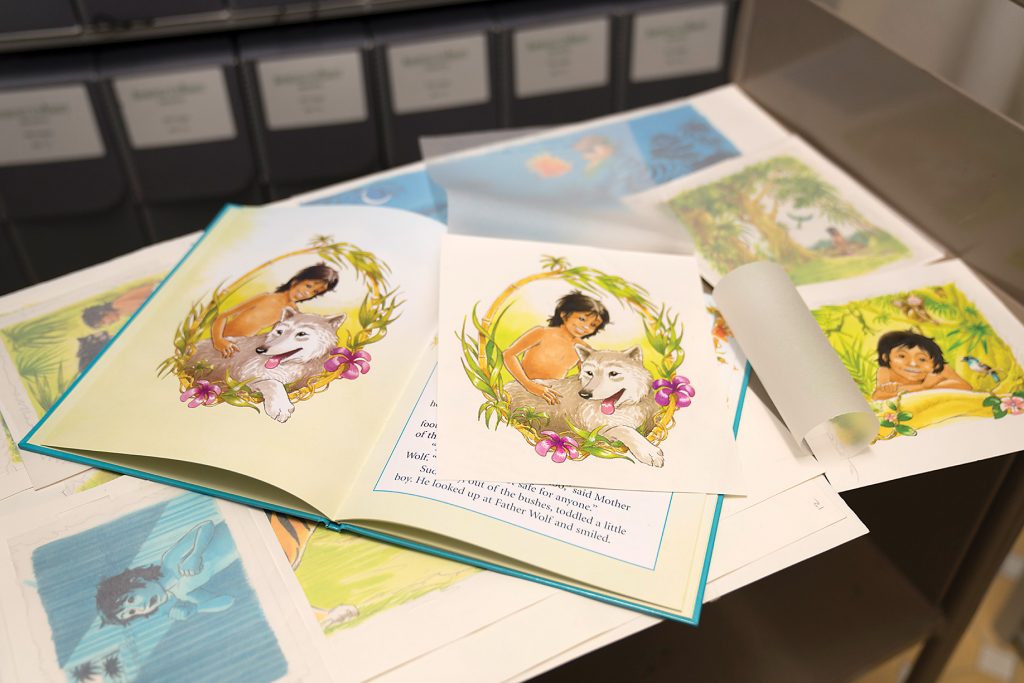
Joel Schick (BA, ’68) was a children’s book illustrator and an artist for Sesame Street, donating his papers to Roosevelt in 2015. These include copies of his books, sketches, original artwork, correspondence, and even some of his old Roosevelt notebooks complete with doodles. Schick gave this collection to Roosevelt, he said, to show how art is produced — by “refining, redrawing, re-imagining, editing and discarding,” and to leave a record of a “journeyman illustrator.”
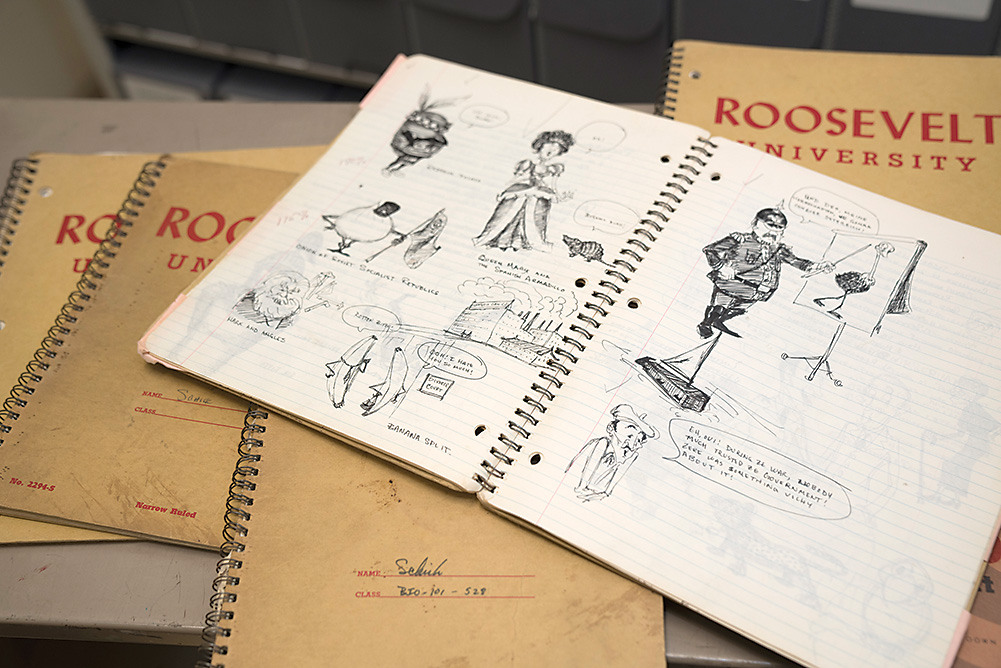
Christopher Reed Collection
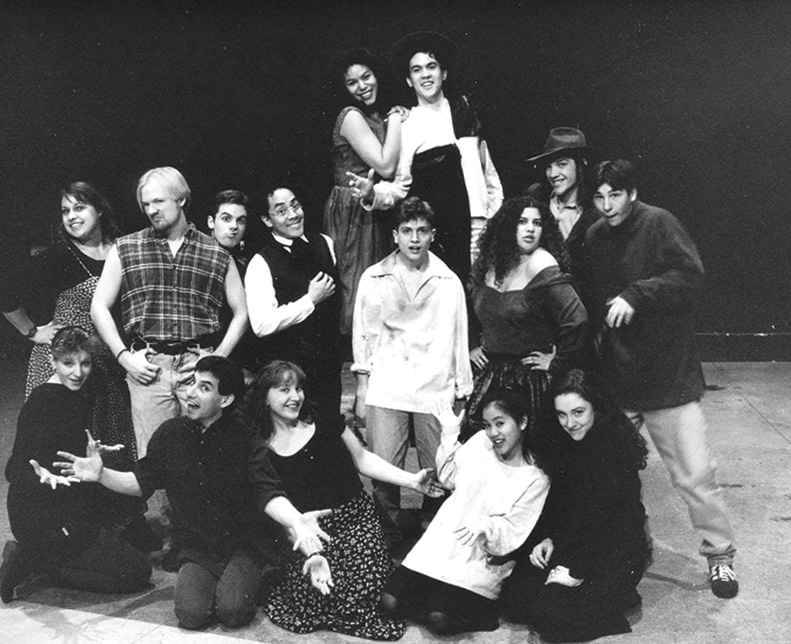
Christopher Reed (BA, ’63) was a history professor at Roosevelt from 1987–2009. He has written several books on the history of black Chicago and donated his collection of papers, books and photos related to Bronzeville and other Chicago sites central to African-American history.
Center for New Deal Studies Collection
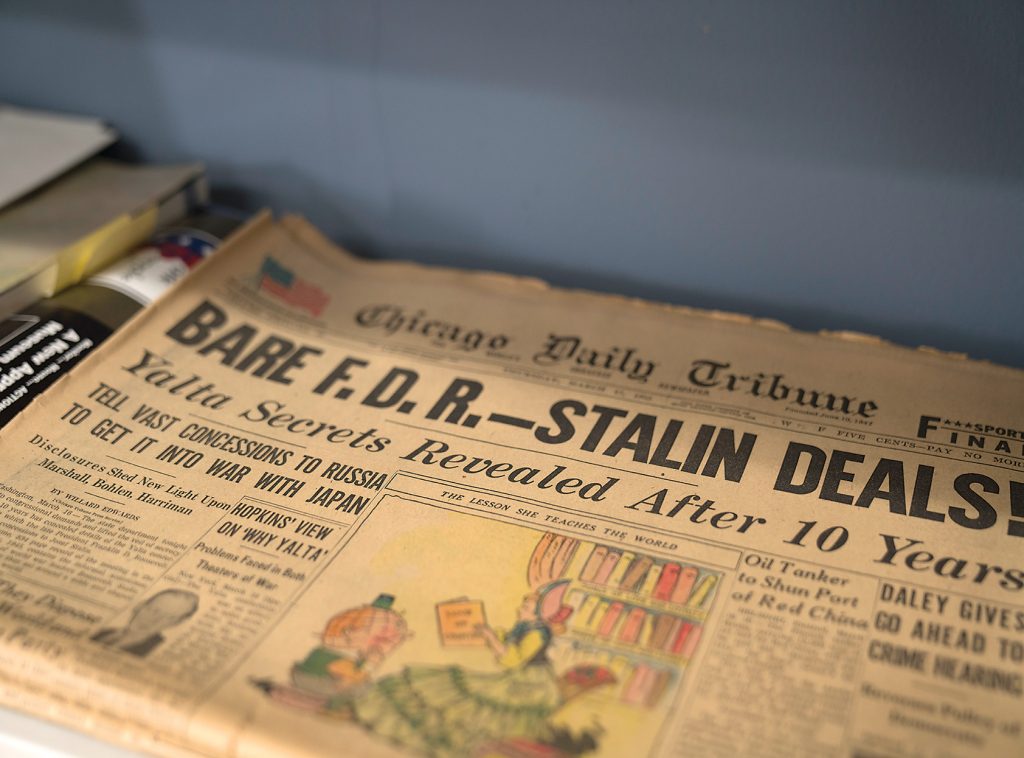
In 1996, Chicago labor attorney Joe Jacobs donated his collection of artifacts related to Franklin D. Roosevelt to the University. These include a significant political button collection, paintings, commemorative dishware, clocks, comic books, campaign textiles and advertising featuring the New Deal and FDR. Many of these are displayed in the Center for New Deal Studies office in the Auditorium Building, along with some 1,300 books related to the Roosevelts, the New Deal and World War II.
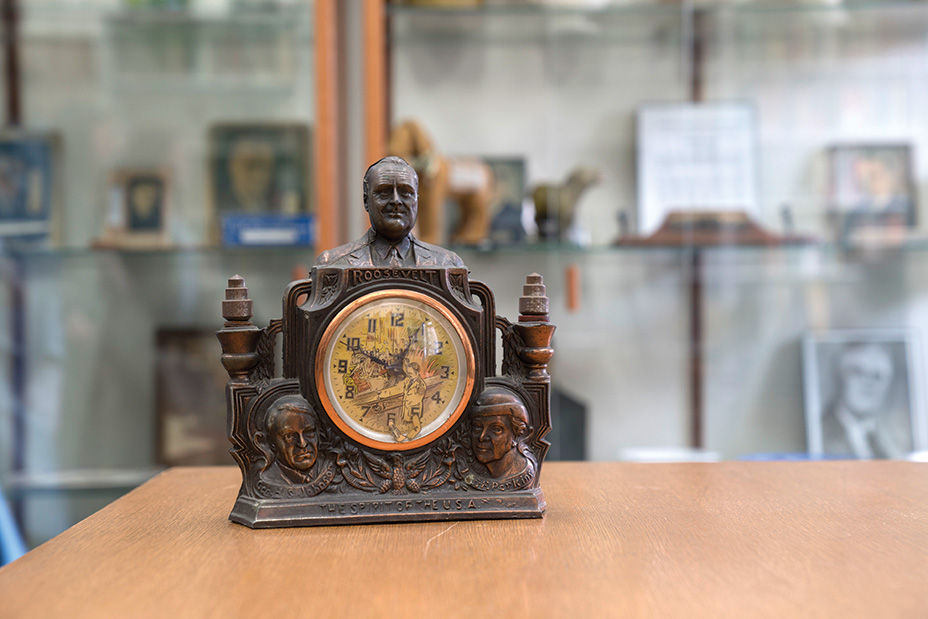
These archives are a resource for Chicago Metro History Fair competitors from area schools, and also contain the papers of Albert Lepawsky (1908-1992), a scholar of public policy and the New Deal. Objects from the collection have been featured in documentary films and exhibited at such venues as the Chicago History Museum.

The City Club of Chicago Collection
Documenting the longest-running civic forum in Chicago, this collection includes biographies of executive members; audio recordings; more than 3,000 photographs; and hundreds of program videos, featuring such prominent Chicagoans as the young Senator Barack Obama, Chicago Mayor Rahm Emanuel, and Illinois Secretary of State Jesse White.
Paul Green Collection
The archives have recently received the books and papers of Paul Green, who prior to his death earlier this academic year was the chair of the Department of Political Science and Public Administration, and a widely respected expert on politics. This collection includes his research files, book drafts, class notes, and material relating to the general political process as well as Chicago and Illinois politics.
Chicago Auditorium Association Collection (1886-1931)
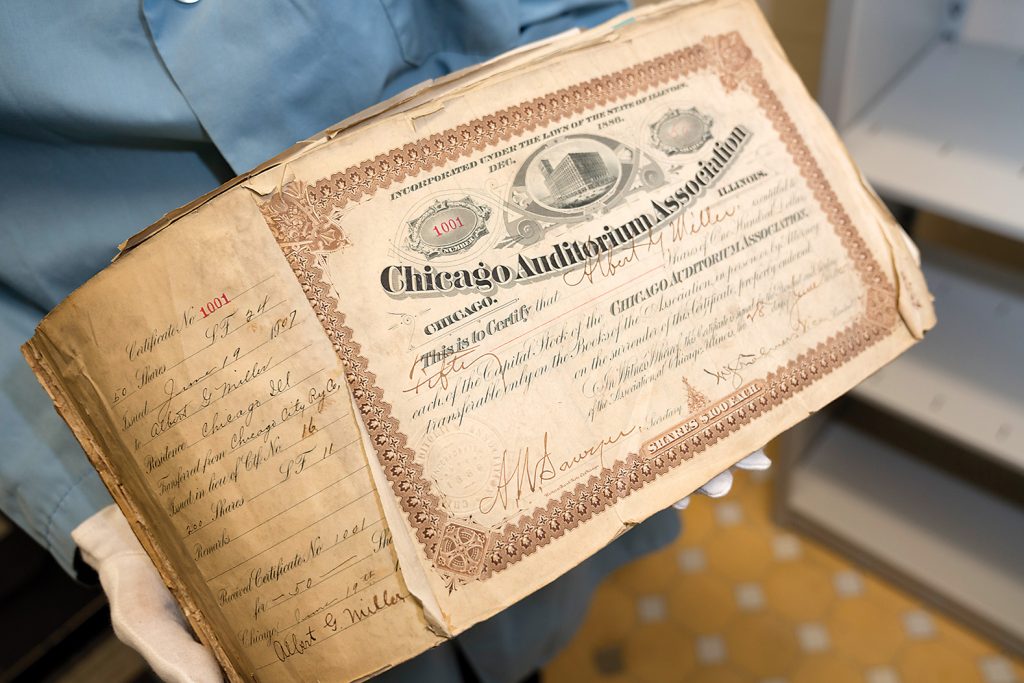
The Auditorium Building is one of Chicago’s iconic structures, created by Dankmar Adler and Louis Sullivan and opened in 1889. This collection includes some of the oldest and most important artifacts in the archives, including documents from Adler’s estate, bond issues for the construction of the building, blueprints, playbills, photographs, records of operation, tiles, stained glass and hotel room keys.

Finally, there are also contemporary accounts of the Chicago World’s Fair of 1893, when the Auditorium Hotel housed many of the fair’s visitors.
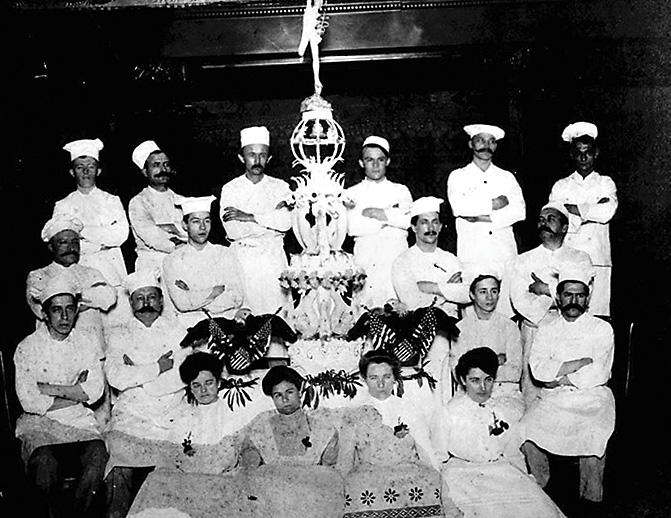
Labor Oral History Collection
Betty Balanoff was a history professor for 28 years, receiving a National Endowment for the Humanities grant in 1970 to conduct and transcribe more than 60 interviews with Chicago area labor activists. These include Mollie Levitas of the Chicago Federation of Labor, Lillian Herstein of the Chicago Teachers Union, Addie Wyatt of the United Food and Commercial Workers, and Irving Abrams and Fred Thompson of the International Workers of the World. In 2001, the Illinois State Library funded a project to digitize these transcripts, which are now available online.
The Illinois Labor History Society Papers
These documents were donated to Roosevelt in 2014 and include items related to the 1886 Haymarket riot, the stockyards and more than 7,600 photographs. There are additional collections from Teamsters Local 743, the Chicago Newspaper Guild and the Retired Teacher’s Union.

